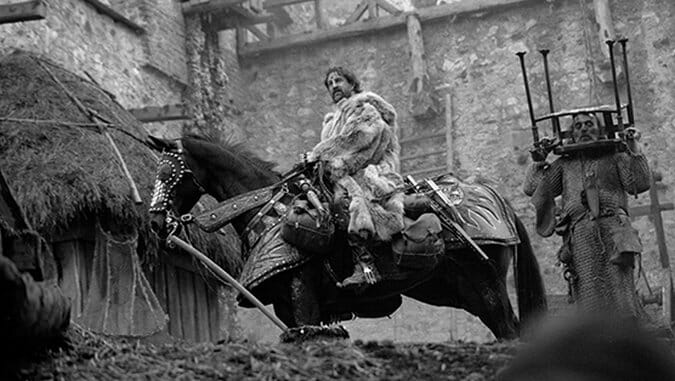Hard to Be a God

Hard to Be a God often gives the impression that it’s doing something remarkable—but after nearly three hours have passed, it’s clear that whatever that something is was never actually very clear. If a story exists, it’s told with little concern over whether the audience knows or cares who the characters are or what they are doing; if that isn’t the case, then an awful lot of dialogue is wasted talking about things like blacks, greys and redheads — whoever and whatever they are.
Which is a shame, because Aleksei German’s film is a stark, wild journey through medieval sci-fi filth. Like the drunken bastard child of a dreamy Andrei Tarkovsky epic and a Terry Gilliam yarn, in Hard to Be a God we see hints of Tarkovsky’s pensive takes, as well as his predilection toward existential speculative fiction (he adapted his 1979 film Stalker from a novel by Arkady and Boris Strugatsky, the same Russian brothers who wrote Hard to Be a God in 1964), coupled with a sort of sensory overload as German’s frames wander through countless intricate details that call to mind Gilliam, another director attracted to obsessive, timeless dystopia.
Sadly, Hard to Be a God marks German’s final film. With pre-production starting in the late 1990s, principale photography didn’t begin until 2006; German died while completing editing in 2013. Though he only made six features in his 46-year career, the Russian director has been revered for decades by a select few cinephiles, who generally point to his early work, like 1971’s Trial On the Road. German’s failure to find wider recognition can partly be attributed to his films’ reliance on cultural and historical references that may be difficult for non-Russians to comprehend. In this case, however, even memorizing the book might not make things that much easier to understand.
The plot is most salient in its opening voiceover narration: The story is set on a planet similar to Earth, but about eight centuries behind technology-wise. Having just quashed a would-be Renaissance, the ruling class has firmly planted this world in the Middle Ages. Thinkers, wiremen and artists were either driven out of the civilization’s capital, Arkanar, or imprisoned, tortured and murdered. Meanwhile, 30 scientists from real-Earth visit the planet to study it and follow its history—but not interfere. These interplanetary explorers are the titular gods, superior to the primitive people of this planet, yet unable to do anything but watch, and sometimes join in on all the filth-wallowing.
-

-

-

-

-

-

-

-

-

-

-

-

-

-

-

-

-

-

-

-

-

-

-

-

-

-

-

-

-

-

-

-

-

-

-

-

-

-

-

-








































